Bryan Singer // 2014 // 131 mins
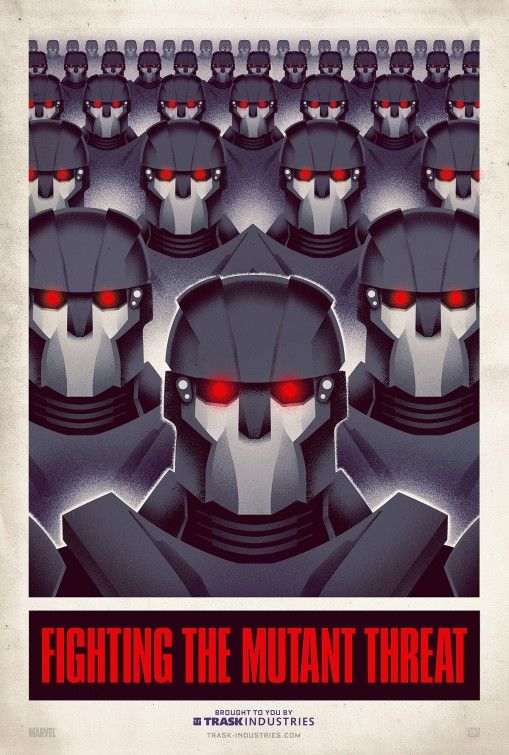 Bringing together the casts of the original X-Men trilogy and Matthew Vaghn's recent semi-reboot/prequel First Class, Days of Future Past is the most ambitious X-Men film to date. Sent back to the 1970's Wolverine (Hugh Jackman) must reunite Xavier (James McAvoy) and Magneto (Michael Fassbender) in order to prevent Mystique (Jennifer Lawrence) from committing an assassination that sets into motion the production of giant robot Sentinels that have rendered mutants nearly extinct in the future. More so than any other previous film in the series, Days of Future Past realises with great success the way in which the X-Men can utilise their powers in order to work together as an actual team, rather than individuals who each take turns at attacking the bad guys. This impressive development is mainly due to the introduction of new mutant Blink (Bingbing Fan), and is fully showcased within the films opening scene, which means that the film hits it's stride very early on and struggles to maintain this excitement once Logan is sent back in time. It is a shame that in a film that boasts such an impressive and extensive cast so many characters are sidelined in order for yet another episode of the Wolverine show, but for once his prominence is actually justified within the plot. Countless cameos scattered throughout the narrative really help to merge the two worlds of the previous films and make for an enjoyable game of spot the mutant, it's just a shame not every returning character gets to join in on the spectacularly choreographed battle scenes.
Bringing together the casts of the original X-Men trilogy and Matthew Vaghn's recent semi-reboot/prequel First Class, Days of Future Past is the most ambitious X-Men film to date. Sent back to the 1970's Wolverine (Hugh Jackman) must reunite Xavier (James McAvoy) and Magneto (Michael Fassbender) in order to prevent Mystique (Jennifer Lawrence) from committing an assassination that sets into motion the production of giant robot Sentinels that have rendered mutants nearly extinct in the future. More so than any other previous film in the series, Days of Future Past realises with great success the way in which the X-Men can utilise their powers in order to work together as an actual team, rather than individuals who each take turns at attacking the bad guys. This impressive development is mainly due to the introduction of new mutant Blink (Bingbing Fan), and is fully showcased within the films opening scene, which means that the film hits it's stride very early on and struggles to maintain this excitement once Logan is sent back in time. It is a shame that in a film that boasts such an impressive and extensive cast so many characters are sidelined in order for yet another episode of the Wolverine show, but for once his prominence is actually justified within the plot. Countless cameos scattered throughout the narrative really help to merge the two worlds of the previous films and make for an enjoyable game of spot the mutant, it's just a shame not every returning character gets to join in on the spectacularly choreographed battle scenes.
Surprisingly, perhaps the films most successful character comes in the form of newcomer Evan Peters as Quicksilver. Peters steals the show as the smart-ass speedster in the films funniest scene, competently holding his own against three of Hollywood's current heavy-hitters. Once the plan to prevent Mystique from sealing the fate of all mutants finally kicks in the film loses momentum and the plot becomes a little frustrating as characters make questionable choices and director Bryan Singer indulges himself through effective, large scale set pieces that just aren't entirely necessary. Days of Future Past is an impressive feat, and certainly one of the best X-Men films, though it's greatest individual elements don't really combine to make an equally successful whole. This could have been one of the best superhero films of recent years but in many ways it just feels like an expensive reset button for the franchise. Whatever the future for the X-Men this film has in many areas set standards for how great this series can be and I hope that these new standards are kept.
m
 Bringing together the casts of the original X-Men trilogy and Matthew Vaghn's recent semi-reboot/prequel First Class, Days of Future Past is the most ambitious X-Men film to date. Sent back to the 1970's Wolverine (Hugh Jackman) must reunite Xavier (James McAvoy) and Magneto (Michael Fassbender) in order to prevent Mystique (Jennifer Lawrence) from committing an assassination that sets into motion the production of giant robot Sentinels that have rendered mutants nearly extinct in the future. More so than any other previous film in the series, Days of Future Past realises with great success the way in which the X-Men can utilise their powers in order to work together as an actual team, rather than individuals who each take turns at attacking the bad guys. This impressive development is mainly due to the introduction of new mutant Blink (Bingbing Fan), and is fully showcased within the films opening scene, which means that the film hits it's stride very early on and struggles to maintain this excitement once Logan is sent back in time. It is a shame that in a film that boasts such an impressive and extensive cast so many characters are sidelined in order for yet another episode of the Wolverine show, but for once his prominence is actually justified within the plot. Countless cameos scattered throughout the narrative really help to merge the two worlds of the previous films and make for an enjoyable game of spot the mutant, it's just a shame not every returning character gets to join in on the spectacularly choreographed battle scenes.
Bringing together the casts of the original X-Men trilogy and Matthew Vaghn's recent semi-reboot/prequel First Class, Days of Future Past is the most ambitious X-Men film to date. Sent back to the 1970's Wolverine (Hugh Jackman) must reunite Xavier (James McAvoy) and Magneto (Michael Fassbender) in order to prevent Mystique (Jennifer Lawrence) from committing an assassination that sets into motion the production of giant robot Sentinels that have rendered mutants nearly extinct in the future. More so than any other previous film in the series, Days of Future Past realises with great success the way in which the X-Men can utilise their powers in order to work together as an actual team, rather than individuals who each take turns at attacking the bad guys. This impressive development is mainly due to the introduction of new mutant Blink (Bingbing Fan), and is fully showcased within the films opening scene, which means that the film hits it's stride very early on and struggles to maintain this excitement once Logan is sent back in time. It is a shame that in a film that boasts such an impressive and extensive cast so many characters are sidelined in order for yet another episode of the Wolverine show, but for once his prominence is actually justified within the plot. Countless cameos scattered throughout the narrative really help to merge the two worlds of the previous films and make for an enjoyable game of spot the mutant, it's just a shame not every returning character gets to join in on the spectacularly choreographed battle scenes.Surprisingly, perhaps the films most successful character comes in the form of newcomer Evan Peters as Quicksilver. Peters steals the show as the smart-ass speedster in the films funniest scene, competently holding his own against three of Hollywood's current heavy-hitters. Once the plan to prevent Mystique from sealing the fate of all mutants finally kicks in the film loses momentum and the plot becomes a little frustrating as characters make questionable choices and director Bryan Singer indulges himself through effective, large scale set pieces that just aren't entirely necessary. Days of Future Past is an impressive feat, and certainly one of the best X-Men films, though it's greatest individual elements don't really combine to make an equally successful whole. This could have been one of the best superhero films of recent years but in many ways it just feels like an expensive reset button for the franchise. Whatever the future for the X-Men this film has in many areas set standards for how great this series can be and I hope that these new standards are kept.
m
Ira Sachs // 2012 // 101 mins
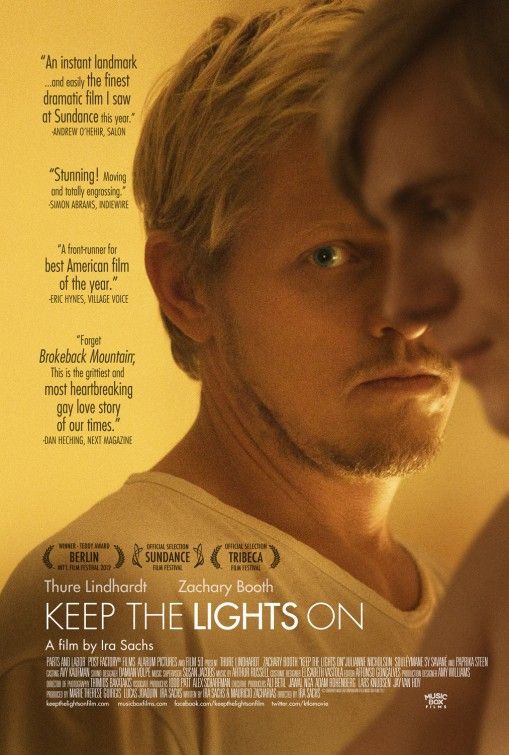 It's the middle of the night and Erik (Thure Lindhardt) is lonely, he calls a hookup line and spends the night with Paul (Zachary Booth). Once their night together seems over Erik begins to get dressed, to which Paul asks "Are you leaving?", an unsure Erik decides to stay and what follows is a decade long, turbulent relationship that pushes both men through their paces and forces them to confront personal demons that they had managed to stay ignorant to while alone.
It's the middle of the night and Erik (Thure Lindhardt) is lonely, he calls a hookup line and spends the night with Paul (Zachary Booth). Once their night together seems over Erik begins to get dressed, to which Paul asks "Are you leaving?", an unsure Erik decides to stay and what follows is a decade long, turbulent relationship that pushes both men through their paces and forces them to confront personal demons that they had managed to stay ignorant to while alone.
Ira Sachs has constructed an epic romance that dissects and then takes us through every single facet of a relationship, Keep the Lights On is an entrancing, unflinching account of love, obsession, heartbreak and growth. Erik is an idealistic Danish documentarian living in New York, Paul is a closeted lawyer for a publishing house developing an addiction to crack. Their relationship moves through the familiar honeymoon stage where they fawn over each other and enjoy learning everything about one another, but there is a point where too much is revealed and things cannot be unlearnt. Paul's drug addiction starts putting a strain on the relationship and so begins a painful, repetitive cycle in which they fight for their love, drift away from each other and then try to make things work again. But Paul is not alone in struggling with addiction, though his may be the more obvious, recognisable example. Erik is addicted to love, to companionship, and seeks it out as desperately and regularly as Paul does with drugs. There are countless instances throughout the film where Erik is made aware, either through his own epiphany or through a friend telling him, that he and Paul are no good for each other and should consider moving on, but he ignores these facts and continues to fight for his love. While this passion for Paul is admirable, understandable and would even be celebrated in a regular romance story Sachs film shows the problems with their relationship in such a frank, matter-of-fact manner that we know any future shared between these men would be doomed.
Occasionally the narrative drifts slightly and we encounter Erik's close friends and sister, while these scenes help us see Erik's life away from Paul the story is so much stronger when kept exclusively between the two of them. Lindhardt and Booth are equally brilliant in making their characters feel painfully real, and it is down to them that the film succeeds at all because these two men each become quite distant and unlikable at times but the performances keep us invested, keep us caring for them and above all keep us hoping for the best even when it becomes abundantly clear that the lights most definitely need to be shut off on their relationship. A bracingly intimate depiction of a destructive romance, Keep the Lights On is huge in scope but impressively modest in it's execution.
 It's the middle of the night and Erik (Thure Lindhardt) is lonely, he calls a hookup line and spends the night with Paul (Zachary Booth). Once their night together seems over Erik begins to get dressed, to which Paul asks "Are you leaving?", an unsure Erik decides to stay and what follows is a decade long, turbulent relationship that pushes both men through their paces and forces them to confront personal demons that they had managed to stay ignorant to while alone.
It's the middle of the night and Erik (Thure Lindhardt) is lonely, he calls a hookup line and spends the night with Paul (Zachary Booth). Once their night together seems over Erik begins to get dressed, to which Paul asks "Are you leaving?", an unsure Erik decides to stay and what follows is a decade long, turbulent relationship that pushes both men through their paces and forces them to confront personal demons that they had managed to stay ignorant to while alone.Ira Sachs has constructed an epic romance that dissects and then takes us through every single facet of a relationship, Keep the Lights On is an entrancing, unflinching account of love, obsession, heartbreak and growth. Erik is an idealistic Danish documentarian living in New York, Paul is a closeted lawyer for a publishing house developing an addiction to crack. Their relationship moves through the familiar honeymoon stage where they fawn over each other and enjoy learning everything about one another, but there is a point where too much is revealed and things cannot be unlearnt. Paul's drug addiction starts putting a strain on the relationship and so begins a painful, repetitive cycle in which they fight for their love, drift away from each other and then try to make things work again. But Paul is not alone in struggling with addiction, though his may be the more obvious, recognisable example. Erik is addicted to love, to companionship, and seeks it out as desperately and regularly as Paul does with drugs. There are countless instances throughout the film where Erik is made aware, either through his own epiphany or through a friend telling him, that he and Paul are no good for each other and should consider moving on, but he ignores these facts and continues to fight for his love. While this passion for Paul is admirable, understandable and would even be celebrated in a regular romance story Sachs film shows the problems with their relationship in such a frank, matter-of-fact manner that we know any future shared between these men would be doomed.
Occasionally the narrative drifts slightly and we encounter Erik's close friends and sister, while these scenes help us see Erik's life away from Paul the story is so much stronger when kept exclusively between the two of them. Lindhardt and Booth are equally brilliant in making their characters feel painfully real, and it is down to them that the film succeeds at all because these two men each become quite distant and unlikable at times but the performances keep us invested, keep us caring for them and above all keep us hoping for the best even when it becomes abundantly clear that the lights most definitely need to be shut off on their relationship. A bracingly intimate depiction of a destructive romance, Keep the Lights On is huge in scope but impressively modest in it's execution.
Sofia Coppola // 2010 // 97 mins
 Reviewing a film is a lot like making a sales pitch, you're declaring your position on a product and backing up that position with evidence that will either convince the reader to try out the product or warn them to stay clear of it. The problem is that occasionally you watch a film that you enjoy, love even, and then struggle to articulate in any way why you feel that way about it. Sofia Coppola's Somewhere is one such film. I'll be the first to admit that not a right lot happens in this film, and if theres a deeper commentary on celebrity culture or parenthood it eluded me, but I was completely taken in by the film and charmed by the father/daughter relationship on which it centres.
Reviewing a film is a lot like making a sales pitch, you're declaring your position on a product and backing up that position with evidence that will either convince the reader to try out the product or warn them to stay clear of it. The problem is that occasionally you watch a film that you enjoy, love even, and then struggle to articulate in any way why you feel that way about it. Sofia Coppola's Somewhere is one such film. I'll be the first to admit that not a right lot happens in this film, and if theres a deeper commentary on celebrity culture or parenthood it eluded me, but I was completely taken in by the film and charmed by the father/daughter relationship on which it centres.
Stephen Dorff as Johnny Marco is an actor in-between jobs. He spends his days drinking, wandering around the Chateau Marmont and getting private shows from pole dancing twins, that is, until his daughter Cleo (Elle Fanning) is left with him for an indeterminate amount of time. Coppola has once again produced a beautiful piece of film, but this one is more understated that her previous works and favours a slow, contemplative aesthetic that perfectly captures the lethargic state of her leading man. The film features many small, sweet moments between Johnny and Cleo as they goof around in the swimming pool, take a short trip to Milan or simply laze around the hotel. Through their time together Johnny becomes aware of what he has missed out on by not being a constant presence for his daughter and the film explores how she could possibly be the missing component that has resulted in his constant dissatisfaction despite a seemingly successful professional life. Fanning is wonderful as Cleo and captures both the wide-eyed doting of a young girl who clearly adores her father and the more mature side of a character who in many ways has to take on the parental role herself. In many ways this feels like Coppola possibly trying to recapture the success of Lost in Translation, and though this film never achieves quite that level of success it certainly makes an intriguing companion piece.
In its most primitive form, cinema simply took a step back and watched the lives of regular people unfold in front of the camera. Though these early films were merely showcasing the newly invented technology, who says films today can't take a similar approach; just sit back, take a breath and let us witness a brief moment in a characters life unfold. Somewhere may not be laced with a deeply intellectual meaning, it may not be full of exciting narrative twists and turns but it doesn't need to be and I, for one, enjoyed every low-key minute spent with Johnny and Cleo.
mm
 Reviewing a film is a lot like making a sales pitch, you're declaring your position on a product and backing up that position with evidence that will either convince the reader to try out the product or warn them to stay clear of it. The problem is that occasionally you watch a film that you enjoy, love even, and then struggle to articulate in any way why you feel that way about it. Sofia Coppola's Somewhere is one such film. I'll be the first to admit that not a right lot happens in this film, and if theres a deeper commentary on celebrity culture or parenthood it eluded me, but I was completely taken in by the film and charmed by the father/daughter relationship on which it centres.
Reviewing a film is a lot like making a sales pitch, you're declaring your position on a product and backing up that position with evidence that will either convince the reader to try out the product or warn them to stay clear of it. The problem is that occasionally you watch a film that you enjoy, love even, and then struggle to articulate in any way why you feel that way about it. Sofia Coppola's Somewhere is one such film. I'll be the first to admit that not a right lot happens in this film, and if theres a deeper commentary on celebrity culture or parenthood it eluded me, but I was completely taken in by the film and charmed by the father/daughter relationship on which it centres.Stephen Dorff as Johnny Marco is an actor in-between jobs. He spends his days drinking, wandering around the Chateau Marmont and getting private shows from pole dancing twins, that is, until his daughter Cleo (Elle Fanning) is left with him for an indeterminate amount of time. Coppola has once again produced a beautiful piece of film, but this one is more understated that her previous works and favours a slow, contemplative aesthetic that perfectly captures the lethargic state of her leading man. The film features many small, sweet moments between Johnny and Cleo as they goof around in the swimming pool, take a short trip to Milan or simply laze around the hotel. Through their time together Johnny becomes aware of what he has missed out on by not being a constant presence for his daughter and the film explores how she could possibly be the missing component that has resulted in his constant dissatisfaction despite a seemingly successful professional life. Fanning is wonderful as Cleo and captures both the wide-eyed doting of a young girl who clearly adores her father and the more mature side of a character who in many ways has to take on the parental role herself. In many ways this feels like Coppola possibly trying to recapture the success of Lost in Translation, and though this film never achieves quite that level of success it certainly makes an intriguing companion piece.
In its most primitive form, cinema simply took a step back and watched the lives of regular people unfold in front of the camera. Though these early films were merely showcasing the newly invented technology, who says films today can't take a similar approach; just sit back, take a breath and let us witness a brief moment in a characters life unfold. Somewhere may not be laced with a deeply intellectual meaning, it may not be full of exciting narrative twists and turns but it doesn't need to be and I, for one, enjoyed every low-key minute spent with Johnny and Cleo.
mm
James Franco, Travis Mathews // 2013 // 60 mins
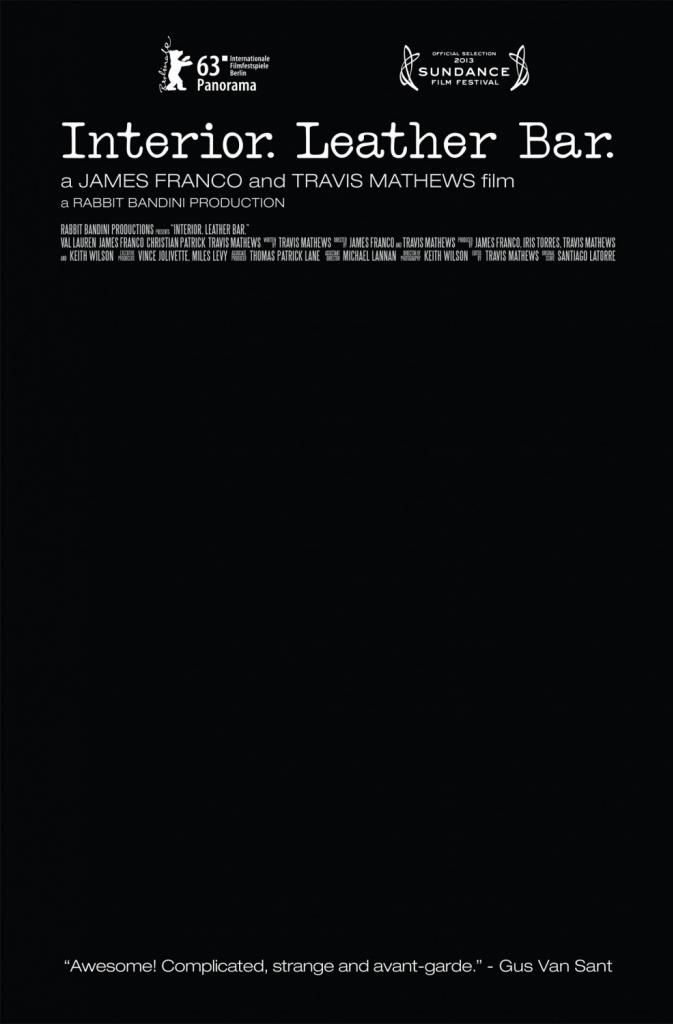 In 1980 director William Friedkin released Cruising, a crime drama starring Al Pacino and set in New York's underground gay S&M subculture, a film which Friedkin has claimed was subjected to extensive cuts at the request of the ratings board, with a total of 40 minutes of footage being removed from the final version. Interior. Leather Bar. is an intriguing project from James Franco and Travis Mathews which claims to be a documentary about the pair attempting to re-imagine those lost 40 minutes, but instead seems to be more an exercise in boundary pushing and exploring attitudes to gay sex and cinema. The film is presented as a documentary following Franco's close actor friend Val Lauren, who is set to play Pacino's character in their 40 minute re-imagining, as he discusses attitudes towards 'playing gay' with the other actors and comes to terms with his own feelings towards the project and it's controversial nature.
In 1980 director William Friedkin released Cruising, a crime drama starring Al Pacino and set in New York's underground gay S&M subculture, a film which Friedkin has claimed was subjected to extensive cuts at the request of the ratings board, with a total of 40 minutes of footage being removed from the final version. Interior. Leather Bar. is an intriguing project from James Franco and Travis Mathews which claims to be a documentary about the pair attempting to re-imagine those lost 40 minutes, but instead seems to be more an exercise in boundary pushing and exploring attitudes to gay sex and cinema. The film is presented as a documentary following Franco's close actor friend Val Lauren, who is set to play Pacino's character in their 40 minute re-imagining, as he discusses attitudes towards 'playing gay' with the other actors and comes to terms with his own feelings towards the project and it's controversial nature.
As the film progresses it becomes clear that re-creating the lost footage from cruising was more of a gimmick and a hook to draw in viewers, as what little of the footage they shot is actually shown is unimpressive and certainly seems more interested in being edgy and shocking than actually representing what may have been cut from Cruising. This is made more evident by the fact that all of the behind the scenes interactions that flesh out the runtime are quite clearly staged, if not entirely scripted. Whether Franco and Mathews felt that scripting these moments would allow them to expose attitudes to homosexuality in the way they desired or not is unclear, but similar conversations would certainly have arisen if they had made an actual documentary about these actors playing gay, and would have been far more effective had they been genuine. After witnessing an unsimulated sex scene between two of the actors Val questions Franco's intentions in making this film and while the actor/director's passion and desire to break down the taboo of gay sex in film and culture is admirable, even he fails to explain how this particular project could ever achieve that. It may well be that this film-posing-as-a-documentary meta-structure has a deeper purpose or message that is lost on me, but all it seems to be is an exercise in discussing a controversial topic in a controversial way that lacks a distinct or effective thesis.
m
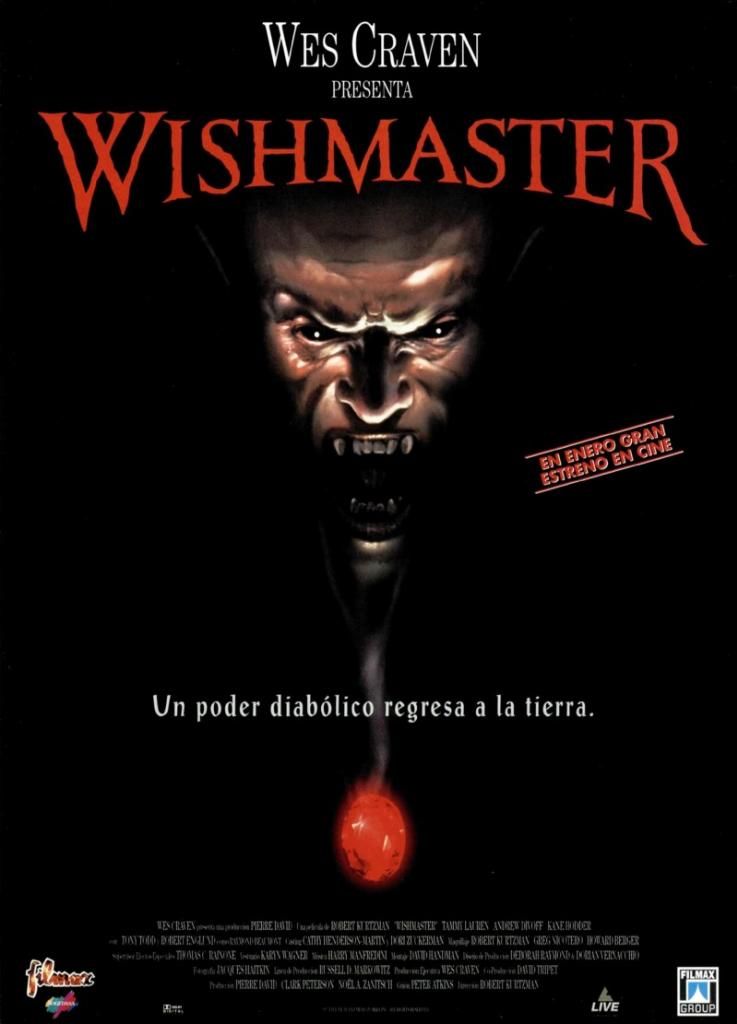 It's no secret that the filmography of my childhood was an unconventional blend of Disney and slasher films. I had seen the majority of the Nightmare on Elm Street, Friday the 13th, Hellraiser and Halloween series' by the time I was starting secondary school, which is too early by anybodies standards I would think. As a result of this early education in horror, I now have a pretty big weakness for trashy horror films from the 70s-90s. One horror franchise from this period that had always intrigued me was the Wishmaster series. The films premise is based around an ancient race of 'genies' known as the Djinn who, by way of granting three wishes to the unfortunate soul that releases them, seek permanent access to our world in order to claim it as their own. When a Djinn is unknowingly released from it's gemstone prison by Alexandra (Tammy Lauren) as she appraises the stone for her auctioneer boss, the demon begins a killing spree that leads him back to Alexandra, the only person who can free him from his purgatory.
It's no secret that the filmography of my childhood was an unconventional blend of Disney and slasher films. I had seen the majority of the Nightmare on Elm Street, Friday the 13th, Hellraiser and Halloween series' by the time I was starting secondary school, which is too early by anybodies standards I would think. As a result of this early education in horror, I now have a pretty big weakness for trashy horror films from the 70s-90s. One horror franchise from this period that had always intrigued me was the Wishmaster series. The films premise is based around an ancient race of 'genies' known as the Djinn who, by way of granting three wishes to the unfortunate soul that releases them, seek permanent access to our world in order to claim it as their own. When a Djinn is unknowingly released from it's gemstone prison by Alexandra (Tammy Lauren) as she appraises the stone for her auctioneer boss, the demon begins a killing spree that leads him back to Alexandra, the only person who can free him from his purgatory.
The films plot is a refreshing change from the usual 'madman in a mask' that dominated the genre at the time and allows for a level of creativity in how the Djinn's victims meet their demise matched only by the likes of Freddy Krueger. The use of more mature characters is also a nice step away from the typical group of sex-starved teenagers that have frustratingly limited intelligence, Alexandra does her fair share of running around and screaming but she is also capable of matching wits with the Djinn and putting up a decent intellectual fight. Unforutnately this potential is marred by really terrible special effects and even worse acting. Andrew Divoff as the Djinn is occasionally effective and sinister, but mainly relies on hammy acting to induce a level of humour into the character that is completely unnecessary, while Lauren and the supporting cast generally range from bad to terrible. There is a certain fun-factor present in Wishmater due to the slew of cameo's from famous horror actors of the time, but aside from that all it really has to offer is a glimpse at the wasted potential of what could have been an original and extremely dark series.
m
 In 1980 director William Friedkin released Cruising, a crime drama starring Al Pacino and set in New York's underground gay S&M subculture, a film which Friedkin has claimed was subjected to extensive cuts at the request of the ratings board, with a total of 40 minutes of footage being removed from the final version. Interior. Leather Bar. is an intriguing project from James Franco and Travis Mathews which claims to be a documentary about the pair attempting to re-imagine those lost 40 minutes, but instead seems to be more an exercise in boundary pushing and exploring attitudes to gay sex and cinema. The film is presented as a documentary following Franco's close actor friend Val Lauren, who is set to play Pacino's character in their 40 minute re-imagining, as he discusses attitudes towards 'playing gay' with the other actors and comes to terms with his own feelings towards the project and it's controversial nature.
In 1980 director William Friedkin released Cruising, a crime drama starring Al Pacino and set in New York's underground gay S&M subculture, a film which Friedkin has claimed was subjected to extensive cuts at the request of the ratings board, with a total of 40 minutes of footage being removed from the final version. Interior. Leather Bar. is an intriguing project from James Franco and Travis Mathews which claims to be a documentary about the pair attempting to re-imagine those lost 40 minutes, but instead seems to be more an exercise in boundary pushing and exploring attitudes to gay sex and cinema. The film is presented as a documentary following Franco's close actor friend Val Lauren, who is set to play Pacino's character in their 40 minute re-imagining, as he discusses attitudes towards 'playing gay' with the other actors and comes to terms with his own feelings towards the project and it's controversial nature.As the film progresses it becomes clear that re-creating the lost footage from cruising was more of a gimmick and a hook to draw in viewers, as what little of the footage they shot is actually shown is unimpressive and certainly seems more interested in being edgy and shocking than actually representing what may have been cut from Cruising. This is made more evident by the fact that all of the behind the scenes interactions that flesh out the runtime are quite clearly staged, if not entirely scripted. Whether Franco and Mathews felt that scripting these moments would allow them to expose attitudes to homosexuality in the way they desired or not is unclear, but similar conversations would certainly have arisen if they had made an actual documentary about these actors playing gay, and would have been far more effective had they been genuine. After witnessing an unsimulated sex scene between two of the actors Val questions Franco's intentions in making this film and while the actor/director's passion and desire to break down the taboo of gay sex in film and culture is admirable, even he fails to explain how this particular project could ever achieve that. It may well be that this film-posing-as-a-documentary meta-structure has a deeper purpose or message that is lost on me, but all it seems to be is an exercise in discussing a controversial topic in a controversial way that lacks a distinct or effective thesis.
m
Robert Kurtzman // 1997 // 90 mins
 It's no secret that the filmography of my childhood was an unconventional blend of Disney and slasher films. I had seen the majority of the Nightmare on Elm Street, Friday the 13th, Hellraiser and Halloween series' by the time I was starting secondary school, which is too early by anybodies standards I would think. As a result of this early education in horror, I now have a pretty big weakness for trashy horror films from the 70s-90s. One horror franchise from this period that had always intrigued me was the Wishmaster series. The films premise is based around an ancient race of 'genies' known as the Djinn who, by way of granting three wishes to the unfortunate soul that releases them, seek permanent access to our world in order to claim it as their own. When a Djinn is unknowingly released from it's gemstone prison by Alexandra (Tammy Lauren) as she appraises the stone for her auctioneer boss, the demon begins a killing spree that leads him back to Alexandra, the only person who can free him from his purgatory.
It's no secret that the filmography of my childhood was an unconventional blend of Disney and slasher films. I had seen the majority of the Nightmare on Elm Street, Friday the 13th, Hellraiser and Halloween series' by the time I was starting secondary school, which is too early by anybodies standards I would think. As a result of this early education in horror, I now have a pretty big weakness for trashy horror films from the 70s-90s. One horror franchise from this period that had always intrigued me was the Wishmaster series. The films premise is based around an ancient race of 'genies' known as the Djinn who, by way of granting three wishes to the unfortunate soul that releases them, seek permanent access to our world in order to claim it as their own. When a Djinn is unknowingly released from it's gemstone prison by Alexandra (Tammy Lauren) as she appraises the stone for her auctioneer boss, the demon begins a killing spree that leads him back to Alexandra, the only person who can free him from his purgatory.The films plot is a refreshing change from the usual 'madman in a mask' that dominated the genre at the time and allows for a level of creativity in how the Djinn's victims meet their demise matched only by the likes of Freddy Krueger. The use of more mature characters is also a nice step away from the typical group of sex-starved teenagers that have frustratingly limited intelligence, Alexandra does her fair share of running around and screaming but she is also capable of matching wits with the Djinn and putting up a decent intellectual fight. Unforutnately this potential is marred by really terrible special effects and even worse acting. Andrew Divoff as the Djinn is occasionally effective and sinister, but mainly relies on hammy acting to induce a level of humour into the character that is completely unnecessary, while Lauren and the supporting cast generally range from bad to terrible. There is a certain fun-factor present in Wishmater due to the slew of cameo's from famous horror actors of the time, but aside from that all it really has to offer is a glimpse at the wasted potential of what could have been an original and extremely dark series.
m

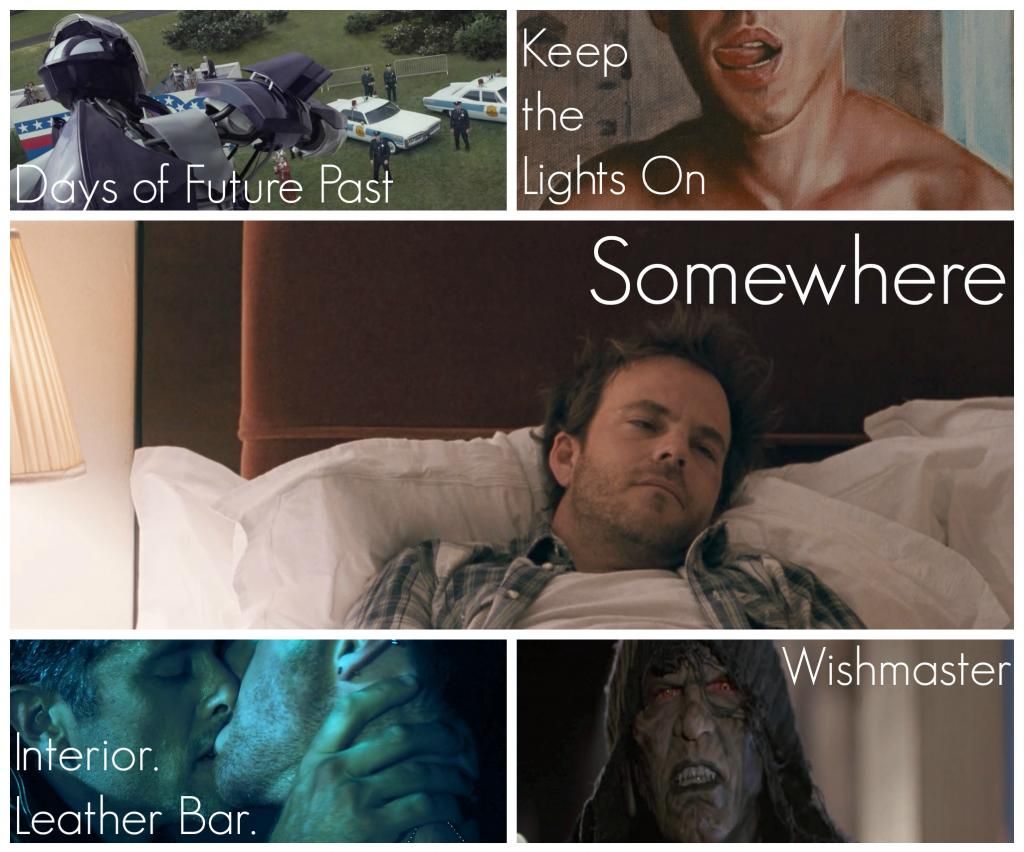
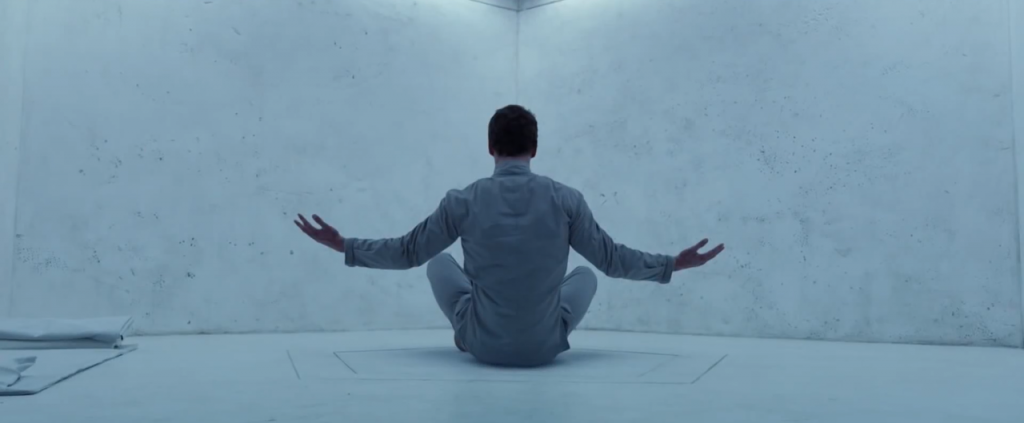
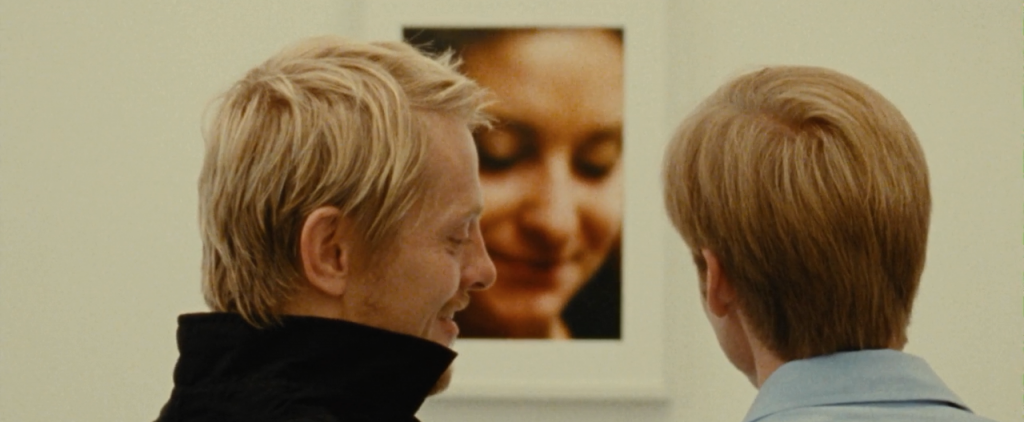
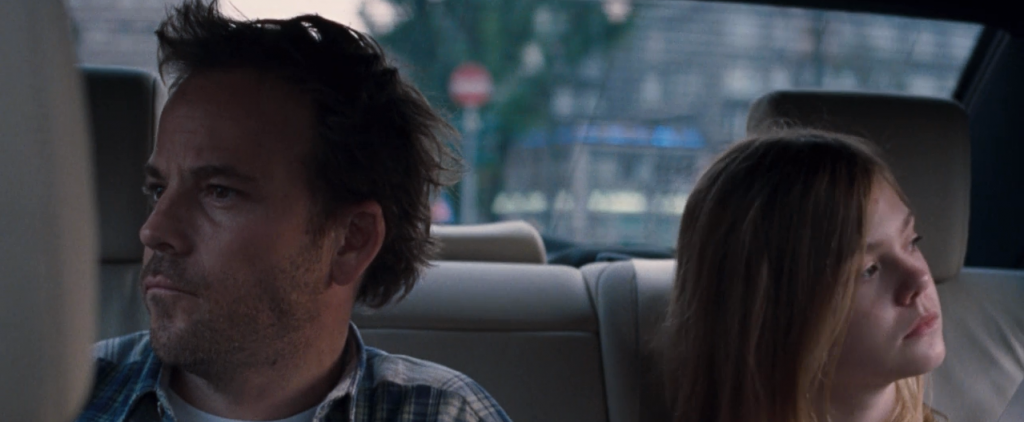


No comments :
Post a Comment